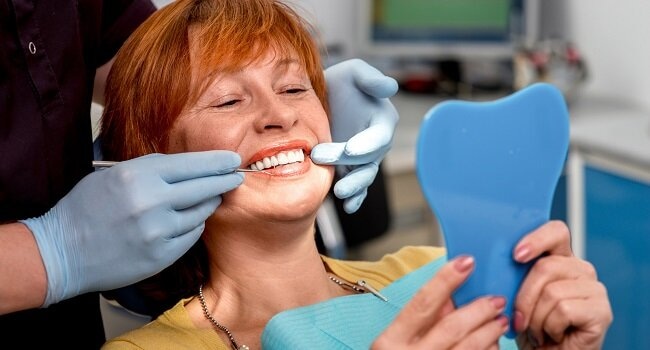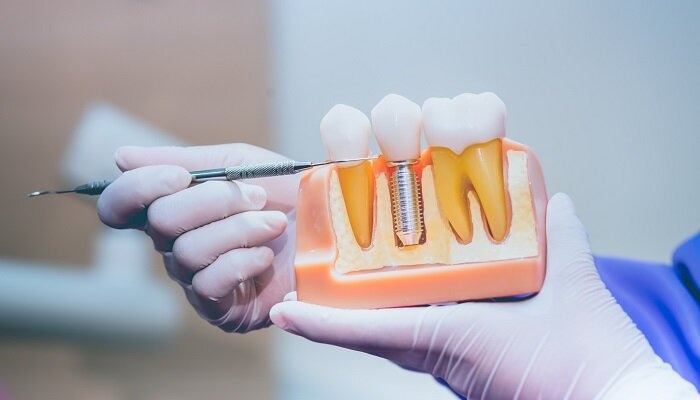Many seniors get dentures as it is a standard solution for dental problems. But there are also those wondering if dental implants are suitable for them. It’s not uncommon to wonder if they have access to a sophisticated dental procedure because implants look more natural. They may also wonder if their age is a factor in getting them or if they will be allowed to get dental implants. This article will tackle the possibility of seniors having dental implants.
What Are Dental Implants?
Dental implants are artificial teeth implanted into the jaw bone to accommodate an artificially made tooth. These implants can accommodate one tooth; for those with no teeth, there are all on 4 teeth replacement available for specific patients.
The implant resembles a screw an experienced dentist must place inside the jawbone. Time is needed for the bone to bind with the implant, which becomes the support for artificial crowns designed to match the rest of your teeth to fit inside your mouth and make it feel natural. The connector holds the crown down to the implant. Implants are sought after because they are the safest and strongest option in dental procedures.
Are Dental Implants Also For The Elderly?
The short answer is yes. There are no age restrictions for getting dental implants. Many seniors ages 60, even up to 90, could get dental implants successfully with excellent results. Implant costs vary depending on the procedure; many could afford it and enjoy the results of getting all their teeth back. Many find dental implants a likely solution, especially for fixed dentures and bridges.
Exceptions Why Seniors Won’t Be Able To Get Implants
In general, implants are for adults with fully developed jawbones. It is a procedure that excludes children and teenagers. While seniors can get them, some won’t be able to have the procedure for these valid reasons:
-
Poor Oral Hygiene
Individuals who lose teeth from to gum disease and decay are unlikely to receive a recommendation for dental implants. If they are unwilling to improve their oral hygiene, the implant may start having problems from poor maintenance.
While dental implants are strong against tooth decay, the surrounding area is still susceptible to peri-implantitis that could result from oral maintenance neglect. Peri-implantitis is an inflammation that develops on the gums and bone. It is the result of the bone around that area. It is crucial that the person who receives the implant become strict with oral hygiene.
-
Inadequate Bone Structure
Not all individuals have enough bone to support dental implants. Before you get approved for the procedure, you will be screened first to see if you have the proper jawbone structure. Lack of bone structure also results from osteoporosis and gum diseases that cause bone deterioration in the mouth. It can be remedied by bone grafting, which is a process of rebuilding the jawbone with a separate bone obtained from another part of your body. You can ask your dentist about it to get more information and if this option is available to you.
-
Bruxism
Some individuals have an unconscious grinding, gritting, or clenching of the teeth called bruxism. It is considered a psychological release from stress and anxiety. But it will also prevent you from getting dental implants. Implants are resistant to the shock created by grinding and clenching.
The issue comes from the implants not having the same structure as your teeth resulting from bruxism. Implant failure may occur if the implant cannot bind appropriately into the jawbone because of the pressure applied by bruxism.

-
Tobacco Smokers And Chewers
If you smoke cigarettes, pipes, cigars, or chew tobacco, dentists won’t recommend that you have dental implants. Tobacco contains hydrogen cyanide, nicotine, and carbon monoxide that hinder the steady flow of blood supply for the jaw to heal appropriately. Smoking is also a factor that contributes to implant failure.
Individuals who are extremely into smoking are considered high-risk, and dentists would opt not to recommend the procedure. Doing so would waste time and resources because it is highly likely to fail. Since integrating the implant into the jawbone can take up to six months or more, the procedure will be wasted on patients who cannot control their bad habits.
Takeaway
Seniors can also get dental implants because the procedure is for adults with fully developed jawbones. Many seniors could get dental implants and a complete set of teeth. But some conditions may prevent individuals from getting implants, such as poor oral hygiene, bruxism, habitual smoking and chewing tobacco, and insufficient bone structure. The last one can be remedied with bone grafting, but it may only work for some.
Seniors who want to get implants can seek advice from their dentists to find out more and if they can be candidates for the procedure.


















